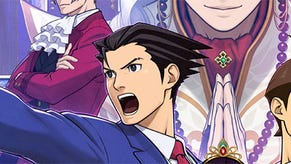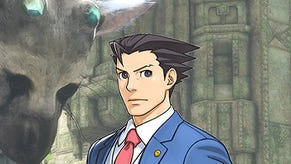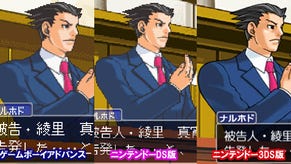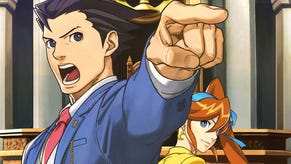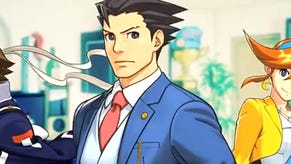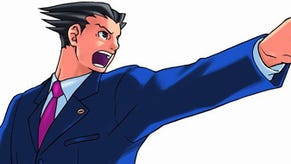Expert Witness: An Interview with Alex Smith, the Writer Behind Ace Attorney's English Debut
The veteran localizer discusses his process, working with Japanese puns, and how Phoenix was nearly named "Roger."
This article first appeared on USgamer, a partner publication of VG247. Some content, such as this article, has been migrated to VG247 for posterity after USgamer's closure - but it has not been edited or further vetted by the VG247 team.
During the Nintendo DS' rocky first year, releasing Ace Attorney's debut in the States stood as a pretty bold move by Capcom. The series had been thriving in Japan (and three games deep) at that point, but its audience was no stranger to this brand of adventure game: long on words, short on action.
With the way Ace Attorney leans so heavily on text, Capcom's lawyer sim could only make a splash in America if the English language version nailed director Shu Takumi's distinct mix of humor and melodrama. Fortunately, Capcom turned to one of the big guns: Alex Smith, whose name you've probably seen in the credits of Vagrant Story, Final Fantasy XII, and Valkyria Chronicles—all games known for their stellar localizations. Without Smith's contributions, it's unlikely Ace Attorney would have received the necessary inertia to keep chugging along in the States: Peer back into reviews from nearly a decade ago, and you'll see nothing but praise heaped upon the game's sparkling script.
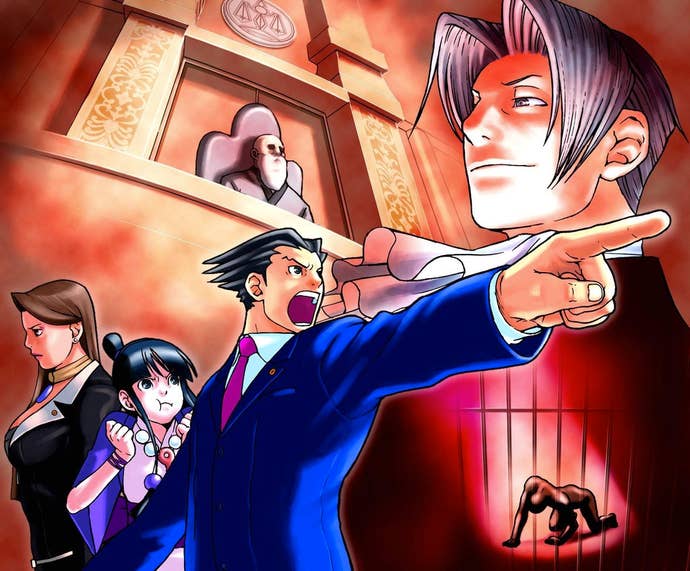
Ace Attorney found Smith while he waited in limbo during the troubled production of Final Fantasy XII; he'd been hired to assist with the game's English language version, and needed something to do in the meantime. Capcom outsourced localization duties for Ace Attorney to a company called Bowne Global (eventually absorbed by Lionbridge) , which employed a few of Smith's Dungeons & Dragons buddies. Knowing Smith's strengths, Bowne Global offered him the gig, and, together with editor and friend Steve Anderson, the localization of Capcom's Stateside gamble had begun.
Even though Smith had little familiarity with Ace Attorney before beginning his work, the quality of the writing immediately struck him. "It really stood out in the crowd," says Smith. "Especially when you're talking about humor, it's very unusual, I think, even in Japan, to have a game of that caliber with the writing as tight as it was... I think there's a tendency to treat those games as kid fodder. From stuff I've seen, when you see something comedic, it's really appealing to the kids more. It's more the He-Man era of Saturday morning cartoons as opposed to the Phineas and Ferb era of Saturday morning cartoons. [With Ace Attorney] there's a writer, there—not something you can say about a lot of Japanese games."
Due to its reliance on puns—a staple of Japanese humor—localizing Ace Attorney offered some unique problems for Smith to solve. In the original version, each character has a Japanese name that relies heavily on wordplay. Phoenix Wright himself, for instance, is known by the surname "Naruhodo," a Japanese expression which means "I see" or "I understand." Smith and Anderson had a lot of leeway with some of the lesser characters of the first Ace Attorney game, but when it came to Wright and the core cast, pinning down their names required some back-and-forth with Capcom, as Smith explains:
"My original suggestion for Phoenix Wright was 'Roger Wright.' I had come up with a list of first names and a list of last names, and submitted that to Capcom. And, in those, 'Phoenix' was one of the first name options, but pretty far down on my list. And Roger was at the top. And 'Wright,' I felt, had to be the his last name, because of the pun in Japanese... 'Naruhodo' was used so many times in the text as a joke. Also, it's just self-deprecating humor, where the one guy whose name is 'I get it!' just doesn't get it. I needed something that was bold and like, 'Yeah right, I got it!' so he could say that and kind of own that attitude, even though he had no idea what he was doing.
"So 'Wright' was there, and 'Roger' was my first choice, because heroes—they like to have alliteration. Also, if you've ever seen the movie Airplane, ['Roger'] is a great source of silly jokes as well. So that seemed like a name with a lot of potential. They ended up going for 'Phoenix' because they liked the heroism of it, and there was a comment from the Japanese dev team—they felt like 'Roger Wright' sounded too much like 'Roger Rabbit,'" says Smith, adding 'Pierce,' 'Xavier,' 'Marcus,' and 'Zane' could also be found on the list of proposed first names for Ace Attorney's protagonist.

Take a look at the characters, environments, and cultural references of Ace Attorney, and it's hard to ignore the game takes place in Japan. Contrary to this surrounding evidence, the English language version of the game establishes the setting as the United States, all thanks to a single piece of evidence from the very first chapter. Though this choice would become less believable with each passing sequel, Smith explains how his hands were tied on the matter: "Normally, what you do in a situation like that is leave [the location] vague. You just say, 'Hey, we're in Nowhere Land,' and you adapt the cultural references that will go over the heads of your audience. The specificity of the setting had to be made because there was an episode where this guy has some sort of clock his girlfriend gave him. It had to be set to some time zone, and we were like, 'Oh, crap. I guess we have to be specific about it.' So we just chose that without really thinking that much about it. And I know this has become an issue in later games, especially—the difficulty in selling where the game is set. The Japanese references have gotten layered on heavier and heavier and heavier."
Game play in the Ace Attorney series often boils down to the specificity of language—which posed a unique challenge to Smith and Anderson. When asked about how he pulled this off so effectively, Smith details his thoughtful approach to this game's localization:
"I remember a lot of the back-and-forth between [the characters] were misunderstandings and wordplay. And the the only way you can translate that is you look at what the scene is doing, and analyze it, really, like a director... When a director gets a script from his writer, he's looking at it, and he's saying, 'I've got these words they have to say, and some information here, but what am I going to make it look like?' He's translating it into this visual medium. And for a translator working on a game like Phoenix Wright, you have to look at it like a director would look at it. You know, 'What's this scene trying to accomplish? Where are the beats in this scene? Okay, there's a punchline here, there's some information seeded in these places, and that gives you your conclusion here—which also has to be humorous and reference the funny gag from five lines earlier.'
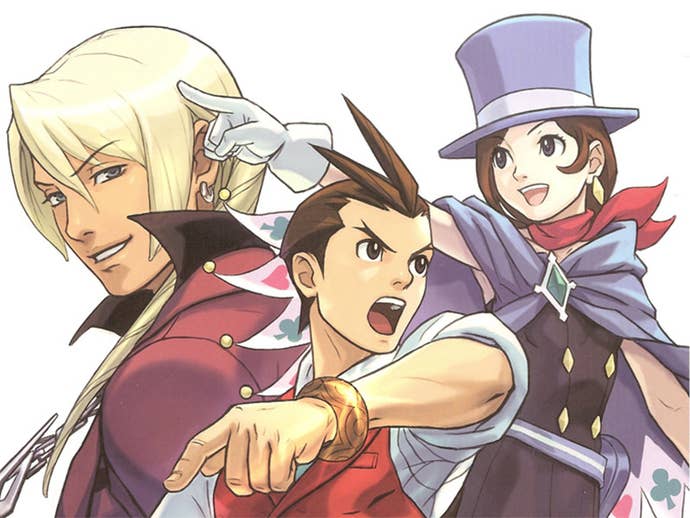
"And so, you've got that scene structure in your head, and then you write it. Sometimes you can use what's there, but a lot times, you have to make it up because the [Japanese] wordplay, of course, is not helpful at all. Although, many times, it directly inspires the wordplay you come up with in the English [version]. And sometimes, you can do wordplay where the Japanese did it, and you have to put it in someplace else, or you shift the structure of the scene around a little bit. Many times, you come up with a funny line or a joke and you adjust the scene to make your joke work, because the old joke wasn't going to work... My guess would be that half of the jokes were rewrites based on the characters in the scene as opposed to whatever the Japanese was saying. It's not a problem of translating the wordplay because you're not translating it."
Smith returned to the Ace Attorney well with 2008's Apollo Justice, but since then, he hasn't touched this Capcom series—and with so many real-life obligations, Smith hasn't exactly caught up with all the continued adventures of Phoenix Wright. Even so, he still shows enthusiasm about the possibility of returning to work on the series. "I'd love to translate another [Ace Attorney] game," says Smith. "I'm sorry that they never called me [to localize] any of the other ones! I'm interested in working on any game that's well written... I think [Ace Attorney] is really interesting because the translator has to step up, otherwise it's just not going to work. It's great to have projects like that. They keep you sane."
If you'd like to know more about Alex Smith's current work, visit Kajiya Productions and Bento Books.

